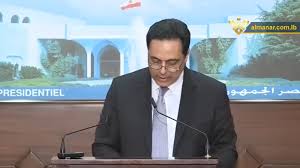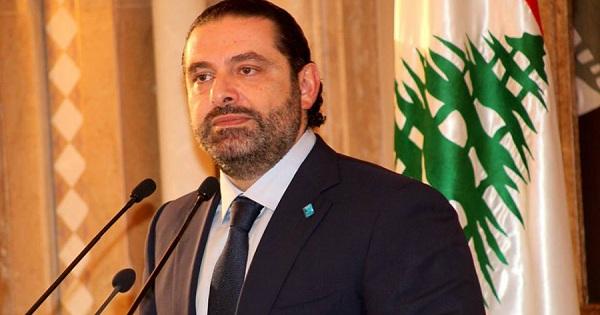BEIRUT (AP) — Lebanon’s prime minister said Friday he is holding the country’s Central Bank governor responsible for the downward spiral of the national currency, accusing him of pursuing “opaque” policies that sent the pound crashing against the dollar.

The government has agreed with Lebanon’s president to hire an independent international auditing company to review the Central Bank’s performance, Prime Minister Hassan Diab said. The move, and the premier’s speech, were an indication of a widening rift with the country’s longtime chief financial decision-maker, Gov. Riad Salameh.
Diab urged Salameh to speak openly to the public about the financial crisis, hinting that the governor has intentionally engineered the crash of the pound.
The Lebanese pound has been on a downward trajectory for weeks amid a worsening liquidity crunch and an economic slump. But it appeared to be in a free fall over the last few days, selling as low as 3,800 pounds to the dollar, down from a fixed peg of 1,500 pounds to the dollar in place for 23 years.
“The Central Bank is either incapable, absent or directly inciting this dramatic depreciation,” Diab said in a televised speech.
The Central Bank’s decision earlier this week requires local banks to convert cash withdrawals from foreign currency accounts to the pound, at a market rate determined daily by the banks. It also applies for money transfers, which was first implemented Friday, when Lebanese media said the rate was 3,625 pounds to the dollar.
The decision sucked dollars out of the market, driving up the black market price, as well as panic among depositors. Protesters took to the streets on Thursday to denounce the governor’s decision in rallies that had all but disappeared since movement restrictions were put in place because of the spread of the coronavirus.
Experts say the Central Bank’s decision is likely to swamp the market with the Lebanese pound and appeared designed to replenish the local banks’ foreign currency reserves and reduce the gaps in their balance sheets.
Salameh, governor since 1993, was a key player in Lebanon’s post-war economy. For the past few years, he has been criticized by the powerful militant Hezbollah group for his implementation of U.S. sanctions against the Iran-backed group.
The Lebanese, who have relied on a stable national currency that was pegged to the dollar since the end of the 1975-1990 civil war, are facing the worst economic and financial crisis in decades. The tiny Mediterranean country of about 5 million people is one the most indebted in the world. Nationwide protests broke out in October against the government because of widespread corruption and mismanagement of resources.
Diab’s government came to office in January and was quickly engulfed in a nationwide health crisis over the novel cornavirus, a crisis that deepened the country’s economic recession.
Diab also accused Salameh of being uncooperative, suggesting the governor is keeping his finances secret, including bank losses estimated to be as high as $3 billion in the last month alone. According to Diab, the numbers show that $5.7 billion in deposits have left the banks between January and February, adding to the liquidity crunch — something he described as a financial “black hole.”
“The public is paying the price for this policy,” Diab said.
Lebanon has a large diaspora that sends foreign currency home — an income that was already dwindling since last year — and relies on transfers from here to Lebanese students studying abroad. Also, many Lebanese keep their savings in foreign currency.
Hariri blasts Diab

Former PM Saad Hariri basted Prime Minister Hassan Diab on Friday accusing them of seeking revenge against “an entire era” while attempting to destroy “the free economic system.”
“Bravo, Hassan Diab. You did a good job. Here you are fulfilling their dreams in destroying the free economic system. They are clapping for you at the (presidential) palace, ” a possible reference to president Aoun and his allies
“How can you ignore the party responsible for half of the public debt through subsidizing electricity and seven years of paralyzing state institutions? How can you not ask about the policies that harmed Lebanon’s Arab and international ties? How can you disregard the responsibilities that should be borne by those practicing a new tutelage over the premiership? Is the central bank governor to blame for all of this?” Hariri asked, addressing Diab.
Hariri is shifting the responsibility for the collapse of the Lebanese economy to Hezbollah and its main ally president Michel Aoun and his FPM party.
Hariri is referring to the roughly $2 billion a year in electricity subsidy because Hezbollah and supporters reportedly refuse to pay for electricity and Hezbollah continues to oppose the privatization of the electric company to allow it to stand on its own .
Lebanon over the years has been dependent financially on the Arab Gulf countries, specially Saudi Arabia, Kuwait and UAE .
These countries have made a habit of depositing funds in the Central bank whenever Lebanon needed help . The citizens of these countries were also the main tourists that used to come to Lebanon every summer spending billions of dollars .
But Hezbollah’s anti Arab behavior , its support for Syria”s dictator and the Yemeni Houthi rebels and its support for Iran’s policies in the Middle East ended this special relation Lebanon had with the Arab Gulf states .
No more deposits in the Central bank
No more tourists from the Gulf
Many Lebanese in the Gulf lost their jobs and their remittances dropped substantially and since January came to a complete halt after Hezbollah took over the country by forming a one color government with its allies .
Many in the Middle East consider Lebanon an Iranian colony specially since Hezbollah chief declared his allegiance to the Iranian supreme leader in September last year
The Associated Press /Agencies/ YL

Leave a Reply
You must be logged in to post a comment.